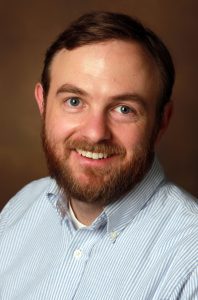Research Spotlight: Christopher Redding
 Q & A with Christopher Redding, Ph.D., Assistant Professor in the School of Human Development and Organizational Studies in Education
Q & A with Christopher Redding, Ph.D., Assistant Professor in the School of Human Development and Organizational Studies in Education
What basic questions does your research seek to answer?
My research uses survey and administrative data to better understand the policies and educator labor market patterns that exacerbate the unequal distribution of high-quality teachers and the reforms intended to reduce this problem. Broadly, this research describes failures in the teacher labor market that impede the learning opportunities for underserved students and the ways in which changes in teacher education, development, and leadership opportunities can lead to better teacher retention and student outcomes, particularly in underserved schools.
What makes your work interesting?
I strive to conduct research that is relevant to both policy and practice. In terms of policy studies, I describe the unique circumstances teachers now face—with stagnating salaries, less pre-service training, and weaker union representation—and how these factors shape teachers’ tenure in the teaching profession. Furthermore, my research identifies the consequences that teacher turnover and the composition of the teacher workforce have on students. I also conduct research relevant to educational improvement. I study programs and practices related to the training and development of teachers, particularly in the context of continuous improvement approaches to school reform.
What are you currently working on?
I have several works in progress. First, I am in the process of publishing pieces from my dissertation, which used data from North Carolina to study within-year teacher turnover. This work includes a descriptive study of the types of teachers who turn over during the school year, a survival analysis of early career teacher turnover, and a study of the effect of teacher turnover on student achievement. Second, I have a number of ongoing projects using national datasets to study new teachers. In one study, I am examining the time it takes prospective teachers to enter the classroom and the occupations they fill prior to becoming teachers. Other studies examine the turnover of alternatively certified teachers, charter school teachers, and special education teachers. Third, from my work with the IES-funded National Center on Scaling Up Effective Schools, I am finalizing a number of papers studying different pieces of a continuous improvement reform model that was implemented in two large urban districts. In addition to a mixed methods evaluation of this reform model, I am working on a number of studies that aim to better understand the challenges with implementing this type of reform model, including studies that examine educators’ use of data, teacher leadership, and cross-school learning.





